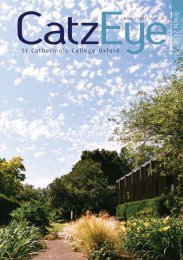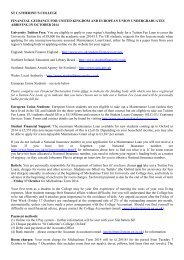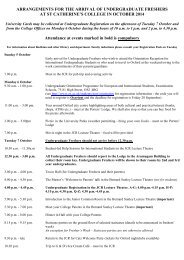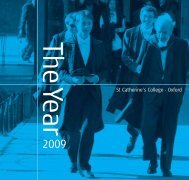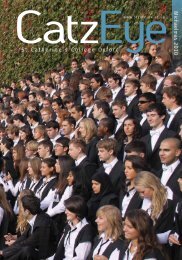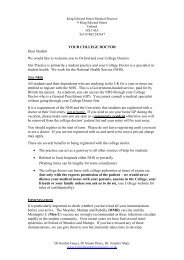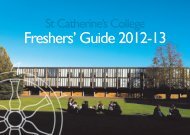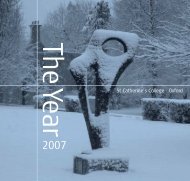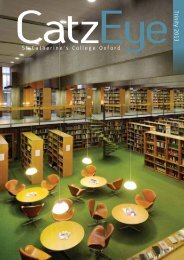Download PDF - St. Catherine's College - University of Oxford
Download PDF - St. Catherine's College - University of Oxford
Download PDF - St. Catherine's College - University of Oxford
You also want an ePaper? Increase the reach of your titles
YUMPU automatically turns print PDFs into web optimized ePapers that Google loves.
GAZETTE<br />
High Court, Queen’s Bench Division, he served<br />
as Presiding Judge on the North Eastern Circuit<br />
from 1988 to 1991.<br />
In 1999, at the Old Bailey, Potts presided at the<br />
trial <strong>of</strong> the 78-year-old former British Rail ticket<br />
inspector Anthony Sawoniuk for the murder <strong>of</strong><br />
Jews while working as a Nazi collaborator in his<br />
native Belarus in 1942.<br />
Sawoniuk had fled Belarus at the end <strong>of</strong><br />
the war and had lived incognito in Britain<br />
ever since. However, after an extraordinary<br />
investigation involving help from the KGB and<br />
witnesses from the Belarussian town where the<br />
atrocities took place, he was eventually traced<br />
to a house in Bermondsey.<br />
It was the first and only trial in Britain under<br />
the War Crimes Act (1991), and involved a trip<br />
to Belarus for Potts, counsel and the jury. After<br />
being found guilty, Sawoniuk was sentenced<br />
by Potts to two life sentences, dying in prison<br />
in 2005.<br />
Potts’s other appointments included<br />
membership <strong>of</strong> the Mental Health Review<br />
Tribunal from 1984 until 1986, and the Criminal<br />
Injuries Compensation Board in 1985-1986. He<br />
was a member <strong>of</strong> the Parole Board from 1992<br />
to 1995 and vice-chairman until 1996. He was<br />
the first chairman <strong>of</strong> the Special Immigration<br />
Appeals Commission from 1997 until 2001.<br />
During the Archer trial, Potts was described<br />
by one newspaper as looking like “an<br />
angry, broad-faced farmer”, yet beneath<br />
his occasionally intimidating exterior he was<br />
kind and considerate with a sunny, unstuffy<br />
disposition which brightened the atmosphere<br />
<strong>of</strong> courtrooms. Though in limited circles he<br />
was known as “Porridge Potts”, he was not<br />
thought <strong>of</strong> as an especially heavy sentencer.<br />
He married, in 1971, Philippa Margaret<br />
Campbell (née Croke). She survives him with<br />
their two sons and his two stepsons.<br />
Reproduced by kind permission <strong>of</strong> The<br />
Telegraph<br />
REV JOHN NICHOLAS CHUBB (1951,<br />
English) was born in 1933, and studied<br />
English at <strong>St</strong> Catherine’s Society. He served as<br />
a parish priest and hospital chaplain.<br />
Susan Chubb<br />
PROFESSOR FRANK<br />
CIOFFI (1952, PPP) died<br />
on 1 January 2012 at the<br />
age <strong>of</strong> 83; a remarkable<br />
member <strong>of</strong> the generation<br />
<strong>of</strong> philosophers educated<br />
in <strong>Oxford</strong> in the early<br />
1950s. In his later career,<br />
he was known for the<br />
fresh, original, combative precision <strong>of</strong> his<br />
essays and lectures, his half-century <strong>of</strong> critical<br />
engagement with Freud and his illuminating<br />
explorations <strong>of</strong> <strong>of</strong>ten neglected aspects<br />
<strong>of</strong> Wittgenstein’s later works. In matters<br />
<strong>of</strong> the mind, he forged and followed his<br />
own pathways. The enormous range <strong>of</strong> his<br />
reading and conversation provided a wealth<br />
<strong>of</strong> accessible examples, <strong>of</strong>ten humorous<br />
or earthy, to anchor difficult philosophical<br />
points. His explorations <strong>of</strong> the character,<br />
scope and complexity <strong>of</strong> humane knowledge<br />
<strong>of</strong>fer strength to those who seek to develop a<br />
philosophy <strong>of</strong> the humanities to supplement<br />
or rival the philosophy <strong>of</strong> science and expand<br />
our philosophical understanding <strong>of</strong> human<br />
knowledge.<br />
As an undergraduate, Ci<strong>of</strong>fi was struck that<br />
some <strong>Oxford</strong> philosophers, so careful in their<br />
analysis <strong>of</strong> philosophical doctrines, failed<br />
to extend their sceptical caution to the<br />
examination <strong>of</strong> the Freudian views that<br />
gripped them. He was especially<br />
impatient with those he considered<br />
to be apologists for Freud. He<br />
held that they failed to ask crucial<br />
questions, for example, about Freud’s<br />
transition from his early seduction<br />
theory to a theory <strong>of</strong> repressed<br />
childhood phantasies <strong>of</strong> parental<br />
abuse or about Freud’s interpretation<br />
<strong>of</strong> many <strong>of</strong> his most famous cases.<br />
ST CATHERINE’S COLLEGE 2012/63



